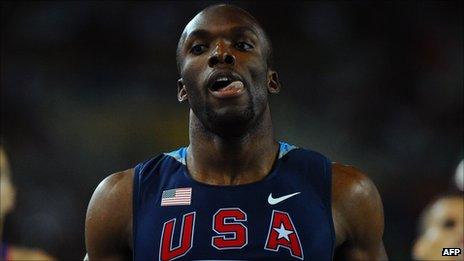LaShawn Merritt gets Olympic doping ban overturned
- Published

Merritt was given a two-year ban, later reduced to 21 months
LaShawn Merritt can defend his Olympic 400m title at London 2012 after winning an appeal against an International Olympic Committee (IOC) doping law.
The IOC's rule had barred any athlete who has received a doping suspension of more than six months from competing in the next Games.
Colin Jackson backs GB Olympic doping policy
The American, 25, argued it went beyond World Anti-Doping Agency (Wada) sanctions of a maximum two-year ban.
The outcome may lead to a change of British Olympic regulations.
A British Olympic Association (BOA) by-law currently imposes a lifetime Olympic ban on those with doping convictions.
But, following the Merritt case, that by-law could potentially be contested by the likes of sprinter Dwain Chambers.
The 33-year-old has tried once before - and failed, external - to overturn his Olympic ban after serving a two-year suspension following his positive test for steroids in 2003.
Merritt and the United States Olympic Committee (USOC) took their case to the Court of Arbitration for Sport (Cas), which overturned the IOC ban.
Merritt, the reigning world 400m champion, was given a two-year suspension, external, later reduced to 21 months, for failing three tests for a banned steroid in early 2010.
Under IOC rule 45, any athlete given a ban longer than six months is prohibited from competing at the next Games.
Now Merritt is looking forward to being able to focus on London 2012.
"I am thrilled to have this uncertainty removed for the 2012 season, and would like to thank the USOC for pursuing this case before CAS," he said.
"I look forward to representing my country and defending my title in the 400m next summer in London at the Olympic Games, and will prepare with even more determination than ever before."
Speaking on BBC Radio 5 Live, after the decision Merritt's lawyer Howard Jacobs added: "I felt confident but, until you receive the decision, there has to be some doubt.
"It's not so much a second chance. He's served his suspension, returned to competition and the rules are supposed to be set up the same. That's what we hoped to achieve, not just for LaShawn but for all athletes."
Brazilian diver Flavia Oliveira, Hungarian wrestler Balazs Kiss, American diver Harrison Jones and US athlete Thomas Freeman could all also benefit from the ruling.
Cycling boss Brailsford seeks doping consistency
Germany's Winter Olympic speed skater Claudia Pechstein, who received a two-year ban for blood doping in 2009, wants to compete as a cyclist in next year's London Games.
She said: "I am totally happy. Justice has prevailed and now the path is clear for my 10th Olympic medal."
Cas said in a statement that IOC rule 45 was "invalid and unenforceable".
But the IOC responded: "The rule was in our view an efficient means to advance the fight against doping, and we were somewhat surprised by the judgement since we had taken an advisory opinion from Cas on the rule and been given a positive response.
"When the moment comes for the revision of the world anti-doping code we will ensure that tougher sanctions, including such a rule, will be seriously considered."
The IOC introduced its own "increased sanction" of an automatic ban from the next Games prior to the 2008 Beijing Olympics.
The Wada code, which came into force in 2004, harmonised rules around the globe and brought in a maximum ban of two years for athletes who test positive for performance-enhancing drugs.
USOC chief executive Scott Blackmun said: "This decision does not diminish our commitment to the fight against doping but, rather, ensures that athletes and national Olympic committees have certainty as they prepare for London."
For latest updates and reaction to this story read Sportsday Live, external Have your say on Twitter, external via the hashtag #bbcsportsday.